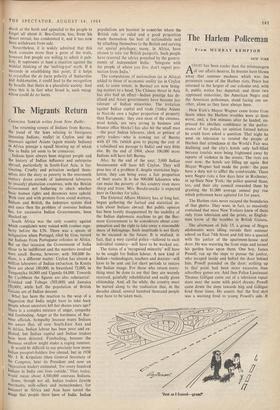The Migrants Return
CHANCHAL SARKAR writes from New Delhi:
The returning coveys of Indians from Burma, the trend of the laws relating to foreigners (meaning Indians, really) in Ceylon and the murmurs against Asians (again mainly Indians) in Africa presage a squall blowing up of which few in India yet seem to be conscious.
Indians have always been migrant people and the history of Indian influence and enterprise abroad, particularly in South-East Asia, is fas- cinating. Cruelty and privation wedged them- selves into the story as poverty in the nineteenth century drove crowds of indentured labourers to (mainly) plantation countries, with the British Government not bothering to check whether basic human rights and decencies were upheld. With time and with protests from social workers, Indians and British, the indenture system died and since then the problem of overseas Indians has, for successive Indian Governments, been Shacked up.
South Africa was the only country against Which complaints were voiced with routine regu- larity before the UN. There was a spasm of indignation when Portugal, riled by Goa, turned out Indians from Portuguese colonies in Africa. But on that occasion the Government of India Chose to be indifferent and the numbers involved Were small. Burma, however, with 500,000 In- dians, is a different matter. Ceylon has almost a million labourers of Indian extraction. In Kenya there are about 180,000, in Swaziland 72,000, in Tanganyika 66,000 and Uganda 64,000. Towards the Caribbean the figures are also substantial: Trinidad and Tobago (303,000) and Jamaica (50,000), while half the population of British Guiana are of Indian descent.
What has been the reaction to the wisp of a suggestion that India might have to take back People whose ancestors left her shores years ago? There is a complex mixture of anger, sympathy and foreboding. Anger at the harshness of Bur- mese officials. Sympathy because many Indians are aware that, all over South-East Asia and M Africa, Indian labour has been poor and ex- Ploited, but Indian capital and Indian traders have been detested. Foreboding, because the Rurmese swallow might make a raging summer.
It would be difficult to say precisely how many Indian passport-holders live abroad, but in 1938 Mr. J. B. Kripalani (then General Secretary of the Congress, later its President and now an 9Pposition leader) estimated, 'for every hundred Indians in India one lives outside.' That, today, Would mean about 4,500,000 overseas Indians.
Some, though not all, Indian traders (textile Merchants, milk-sellers and moneylenders, for Mstance) in Africa and Asia have tarred the linage that people there have of India. Indian populations are heaviest in countries where the British rule or ruled and a good proportion made themselves the butt of nationalistic zeal by attaching themselves to the British and carving out special privileges; many, in Africa, have chosen to take out British passports. Such people have resented the advice preached by the govern- ments of independent India: 'Integrate with the people of where you live, don't expect pro- tection from India.'
The compulsions of nationalism (as in Africa) added to those of economic reality (as in Ceylon and, to some extent, in Burma) are now bring- ing matters to a head. The Chinese thrust in Asia has also had an effect—Indian prestige has de- clined and Asian governments have become less tolerant of Indian minorities. The irritation against Indian capital and trade ('today Asians in Nairobi own a higher proportion of property than Europeans: they own most of the cinemas, most hotels, are very strong in business and finance office blocks') has also hit the small man —the poor Indian labourer, clerk or pettiest of petty traders—who is coming out of Burma with £5 10s. (which goes to paying the cost of a subsidised sea passage to India) and very little else. By the end of 1964, about 100,000 more Indians will have left Burma.
Also, by the end of the year, 3,000 Indian businessmen will have left Ceylon. They will pose less of a problem if, despite restrictive legis- lation, they can bring away a fair proportion of their assets. It is the 900,000 labourers who can make the poverty of this country even more sharp and bitter. Mrs. Bandaranaike is expected here in October for talks.
The External Affairs Ministry has, at long last, begun gathering the factual and statistical de- tails about Indians abroad. But public opinion has been keenly disappointed by the inability of the Indian diplomatic machine to get the Bur- mese Government to be considerate about com- pensation and the right to take away a reasonable share of belongings. Such ineptitude is not likely to be excused in the future. It is realised, in fact, that a very careful policy—tailored to each individual country—wifi have to be worked out.
The status of a 'recognised minority' will have to be sought for Indian labour. A new kind of Indian—technologists, teachers and doctors—will have to be sent out for short periods to restore the Indian image. For those who return every- thing must be done to see that they are warmly received, gainfully rehabilitated and easily given citizenship. And, all the while, the country must be nursed along to the realisation that, in the decades ahead, several hundred thousand people may have to be taken back.




























 Previous page
Previous page